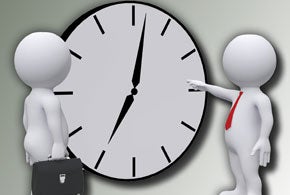
Things Workers Really Say When They’re Running Late
 Time Challenged
Time Challenged
23% of surveyed workers come to work late at least once a month, and 14% do so at least once a week.
 Suspicious Statements
Suspicious Statements
Three out of 10 who have come in late for work said they’ve lied about the reason for their tardiness.
 Most Common Reasons Cited for Tardiness
Most Common Reasons Cited for Tardiness
Traffic: 50%, Lack of sleep: 30%, Bad weather: 26%
 Reasonable Position
Reasonable Position
33% of employers surveyed said they have no problem with occasional late arrivals, as long as they don’t develop into a pattern. And 16% said they don’t need employees to be punctual if they still get their work done.
 Ultimate Price
Ultimate Price
41% of employers have fired a staffer for being late.
 Outrageous Lateness Excuses: Clean Hit
Outrageous Lateness Excuses: Clean Hit
“I knocked myself out in the shower.”
 Outrageous Lateness Excuses: Breakfast of Champions
Outrageous Lateness Excuses: Breakfast of Champions
“I was drunk and forgot which Waffle House I parked my car next to.”
 Outrageous Lateness Excuses: Herd Mentality
Outrageous Lateness Excuses: Herd Mentality
“A deer herd that was moving through town made me late.”
 Outrageous Lateness Excuses: Due Process
Outrageous Lateness Excuses: Due Process
“I had to wait for the judge to set my bail.”
 Outrageous Lateness Excuses: Mindfully Engaged
Outrageous Lateness Excuses: Mindfully Engaged
“I’m not late … I was thinking about work on the way in.”